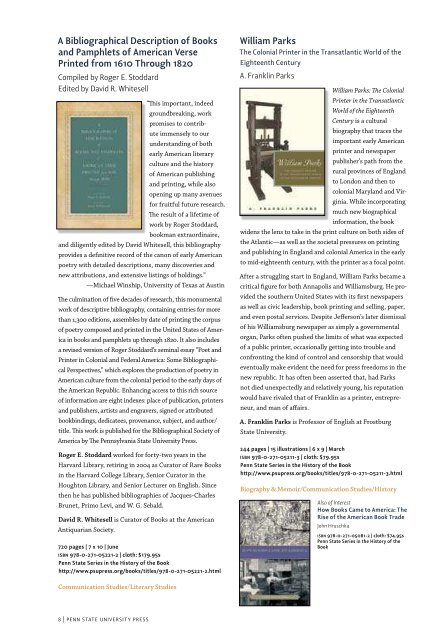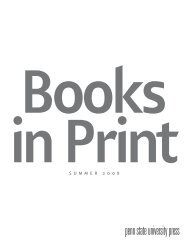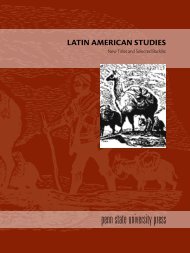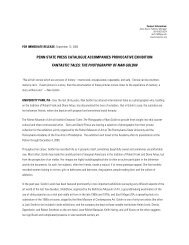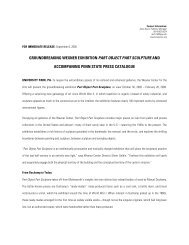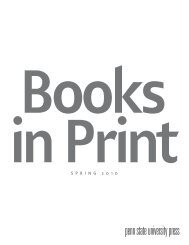journals - Pennsylvania State University Press
journals - Pennsylvania State University Press
journals - Pennsylvania State University Press
You also want an ePaper? Increase the reach of your titles
YUMPU automatically turns print PDFs into web optimized ePapers that Google loves.
A Bibliographical Description of Books<br />
and Pamphlets of American Verse<br />
Printed from 1610 Through 1820<br />
Compiled by Roger E. Stoddard<br />
Edited by David R. Whitesell<br />
“This important, indeed<br />
groundbreaking, work<br />
promises to contrib-<br />
ute immensely to our<br />
understanding of both<br />
early American literary<br />
culture and the history<br />
of American publishing<br />
and printing, while also<br />
opening up many avenues<br />
for fruitful future research.<br />
The result of a lifetime of<br />
work by Roger Stoddard,<br />
bookman extraordinaire,<br />
and diligently edited by David Whitesell, this bibliography<br />
provides a definitive record of the canon of early American<br />
poetry with detailed descriptions, many discoveries and<br />
new attributions, and extensive listings of holdings.”<br />
—Michael Winship, <strong>University</strong> of Texas at Austin<br />
The culmination of five decades of research, this monumental<br />
work of descriptive bibliography, containing entries for more<br />
than 1,300 editions, assembles by date of printing the corpus<br />
of poetry composed and printed in the United <strong>State</strong>s of America<br />
in books and pamphlets up through 1820. It also includes<br />
a revised version of Roger Stoddard’s seminal essay “Poet and<br />
Printer in Colonial and Federal America: Some Bibliographical<br />
Perspectives,” which explores the production of poetry in<br />
American culture from the colonial period to the early days of<br />
the American Republic. Enhancing access to this rich source<br />
of information are eight indexes: place of publication, printers<br />
and publishers, artists and engravers, signed or attributed<br />
bookbindings, dedicatees, provenance, subject, and author/<br />
title. This work is published for the Bibliographical Society of<br />
America by The <strong>Pennsylvania</strong> <strong>State</strong> <strong>University</strong> <strong>Press</strong>.<br />
Roger E. Stoddard worked for forty-two years in the<br />
Harvard Library, retiring in 2004 as Curator of Rare Books<br />
in the Harvard College Library, Senior Curator in the<br />
Houghton Library, and Senior Lecturer on English. Since<br />
then he has published bibliographies of Jacques-Charles<br />
Brunet, Primo Levi, and W. G. Sebald.<br />
David R. Whitesell is Curator of Books at the American<br />
Antiquarian Society.<br />
720 pages | 7 x 10 | June<br />
isbn 978-0-271-05221-2 | cloth: $179.95s<br />
Penn <strong>State</strong> Series in the History of the Book<br />
http://www.psupress.org/books/titles/978-0-271-05221-2.html<br />
Communication Studies/Literary Studies<br />
William Parks<br />
The Colonial Printer in the Transatlantic World of the<br />
Eighteenth Century<br />
A. Franklin Parks<br />
William Parks: The Colonial<br />
Printer in the Transatlantic<br />
World of the Eighteenth<br />
Century is a cultural<br />
biography that traces the<br />
important early American<br />
printer and newspaper<br />
publisher’s path from the<br />
rural provinces of England<br />
to London and then to<br />
colonial Maryland and Virginia.<br />
While incorporating<br />
much new biographical<br />
information, the book<br />
widens the lens to take in the print culture on both sides of<br />
the Atlantic—as well as the societal pressures on printing<br />
and publishing in England and colonial America in the early<br />
to mid-eighteenth century, with the printer as a focal point.<br />
After a struggling start in England, William Parks became a<br />
critical figure for both Annapolis and Williamsburg. He provided<br />
the southern United <strong>State</strong>s with its first newspapers<br />
as well as civic leadership, book printing and selling, paper,<br />
and even postal services. Despite Jefferson’s later dismissal<br />
of his Williamsburg newspaper as simply a governmental<br />
organ, Parks often pushed the limits of what was expected<br />
of a public printer, occasionally getting into trouble and<br />
confronting the kind of control and censorship that would<br />
eventually make evident the need for press freedoms in the<br />
new republic. It has often been asserted that, had Parks<br />
not died unexpectedly and relatively young, his reputation<br />
would have rivaled that of Franklin as a printer, entrepreneur,<br />
and man of affairs.<br />
A. Franklin Parks is Professor of English at Frostburg<br />
<strong>State</strong> <strong>University</strong>.<br />
244 pages | 15 illustrations | 6 x 9 | March<br />
isbn 978-0-271-05211-3 | cloth: $79.95s<br />
Penn <strong>State</strong> Series in the History of the Book<br />
http://www.psupress.org/books/titles/978-0-271-05211-3.html<br />
Biography & Memoir/Communication Studies/History<br />
Also of Interest<br />
How Books Came to America: The<br />
Rise of the American Book Trade<br />
John Hruschka<br />
isbn 978-0-271-05081-2 | cloth: $74.95s<br />
Penn <strong>State</strong> Series in the History of the<br />
Book<br />
Condorcet<br />
Writings on the United <strong>State</strong>s<br />
Edited, translated, and with an introduction by<br />
Guillaume Ansart<br />
“The volume is a vital,<br />
genuinely original contribution<br />
to the literature<br />
on Condorcet’s political<br />
thought—and how he<br />
applied his general views<br />
on republicanism and constitutionalism<br />
to the case<br />
of the United <strong>State</strong>s—as<br />
well as on early European<br />
responses to American constitutional<br />
development.”<br />
—Eileen Botting,<br />
<strong>University</strong> of Notre Dame<br />
Condorcet (1743–1794) was the last of the great eighteenthcentury<br />
French philosophes and one of the most fervent<br />
américanistes of his time. A friend of Franklin, Jefferson,<br />
and Thomas Paine and a member of the American Philosophical<br />
Society, he was well informed and enthusiastic<br />
about the American Revolution. Condorcet’s writings on<br />
the American Revolution, the Federal Constitution, and<br />
the new political culture emerging in the United <strong>State</strong>s<br />
constitute milestones in the history of French political<br />
thought and of French attitudes toward the United<br />
<strong>State</strong>s—yet these remarkable texts have not been available<br />
in modern editions or translations. This book presents first<br />
or new translations of all of Condorcet’s major writings<br />
on the United <strong>State</strong>s, including an essay on the impact of<br />
the American Revolution on Europe; a commentary on<br />
the Federal Constitution, the first such commentary to<br />
be published in the Old World; and his Eulogy of Franklin,<br />
where Condorcet paints a vivid picture of his recently<br />
deceased friend as the archetype of the new American man:<br />
self-made, practical, talented but modest, tolerant and free<br />
of prejudice—the embodiment of reason, common sense,<br />
and the liberal values of the Enlightenment.<br />
Guillaume Ansart is Associate Professor of French Literature<br />
at Indiana <strong>University</strong>, Bloomington.<br />
152 pages | 6 x 9 | July<br />
isbn 978-0-271-05381-3 | cloth: $62.95s<br />
http://www.psupress.org/books/titles/978-0-271-05381-3.html<br />
History/Literary Studies/Philosophy<br />
The Complete Plays of Jean Racine<br />
Volume 4: Athaliah<br />
Jean Racine<br />
Translated into English rhymed couplets with critical<br />
notes and commentary by Geoffrey Alan Argent<br />
As Voltaire famously<br />
opined, Athaliah, Racine’s<br />
last play, is “perhaps the<br />
greatest masterwork of<br />
the human spirit.” Its<br />
formidable antagonists,<br />
Athaliah, queen of Judah,<br />
and Jehoiada, high priest<br />
of the temple of Jerusalem,<br />
are engaged in a deadly<br />
struggle for dominion:<br />
she, fiercely determined to<br />
maintain her throne and<br />
exterminate the detested<br />
race of David; he, no less<br />
fiercely determined to overthrow this heathen queen and<br />
enthrone the orphan Joash, the scion of the house of David,<br />
whom Athaliah believes she slew as an infant ten years<br />
earlier. This boy represents the sole hope for the survival<br />
of the royal race from which is to spring the Christ. But in<br />
this play, even God is more about hate and retribution than<br />
about love and mercy.<br />
This is the fourth volume of a projected translation into<br />
English of all twelve of Jean Racine’s plays—only the third<br />
time such a project has been undertaken. For this new<br />
translation, Geoffrey Alan Argent has rendered these plays<br />
in the verse form that Racine might well have used had<br />
he been English: namely, the “heroic” couplet. Argent has<br />
exploited the couplet’s compressed power and flexibility to<br />
produce a work of English literature, a verse drama as gripping<br />
in English as Racine’s is in French. Complementing<br />
the translation are the illuminating Discussion, intended<br />
as much to provoke discussion as to provide it, and the<br />
extensive Notes and Commentary, which offer their own<br />
fresh and thought-provoking insights.<br />
Geoffrey Alan Argent is an independent scholar residing<br />
in <strong>Pennsylvania</strong>. He was the recipient of a 2011 American<br />
Book Award for The Fratricides, volume 1 of The Complete<br />
Plays of Jean Racine (Penn <strong>State</strong>, 2010).<br />
160 pages | 5 x 8 | May<br />
isbn 978-0-271-05248-9 | cloth: $49.95s<br />
http://www.psupress.org/books/titles/978-0-271-05248-9.html<br />
Literary Studies<br />
8 | penn state university press www.psupress.org | 9


